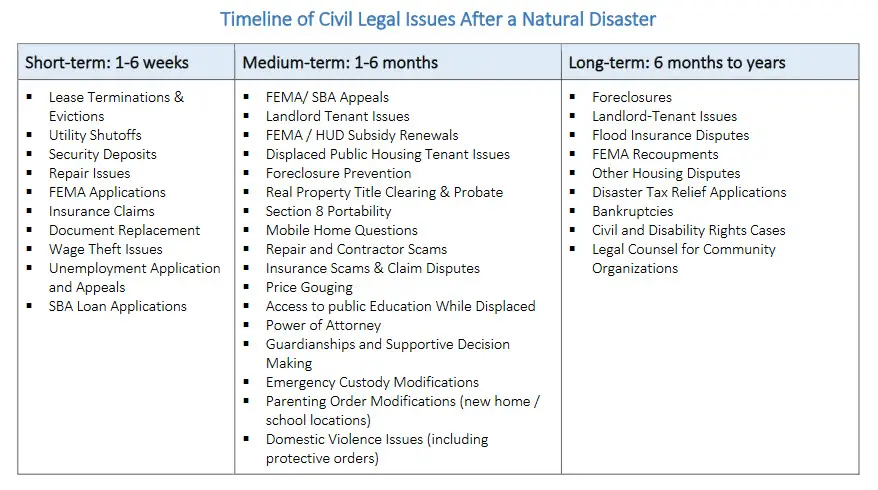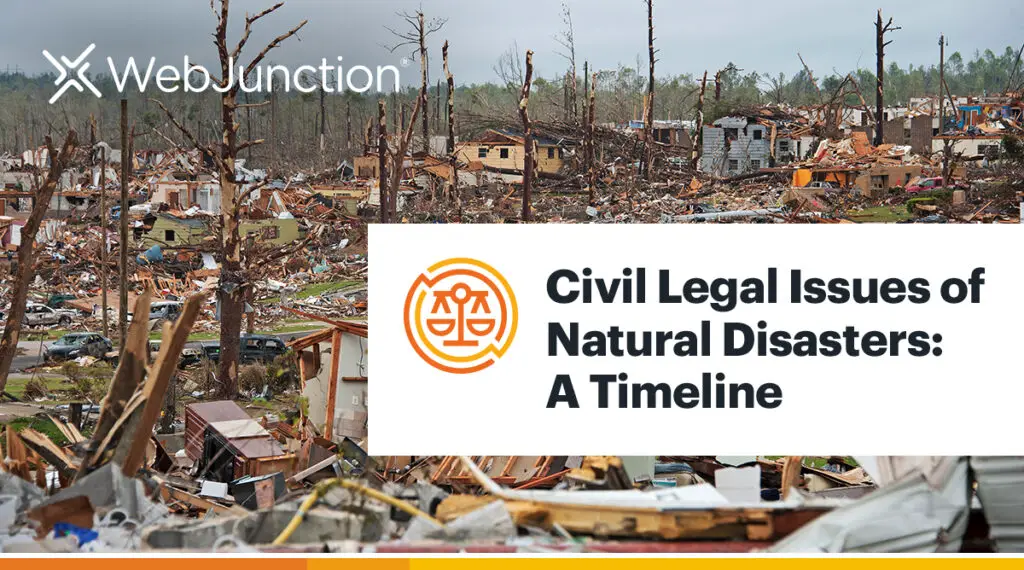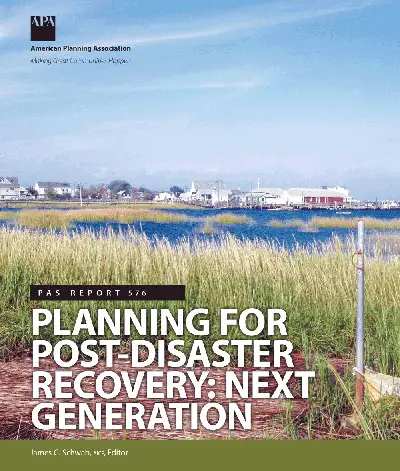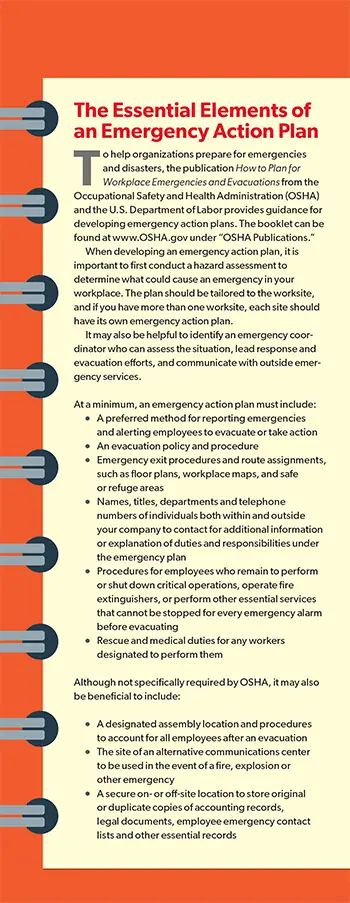Welcome to an informative article on navigating legal issues in post-disaster scenarios. In the aftermath of a natural disaster, it is crucial to understand the legal matters that may arise and how to navigate through them effectively. From insurance claims to property rights, this article will provide you with valuable insights and tips on dealing with legal issues in the wake of a disaster. Stay prepared and informed to protect your rights and navigate the legal landscape with confidence. Have you ever wondered what legal issues you might face in the aftermath of a natural disaster? Whether you’re dealing with property damage, insurance claims, or personal injury, it’s essential to understand your rights and obligations in these challenging situations. In this article, we’ll explore some of the most common legal issues that arise after a disaster and provide you with tips on how to navigate them effectively.

Property Damage Claims
When a natural disaster strikes, one of the most common legal issues that individuals face is property damage. Whether your home has been damaged by a hurricane, flood, wildfire, or other catastrophic event, you may be entitled to compensation from your insurance company. However, navigating the claims process can be complex and overwhelming.
Understanding Your Insurance Policy
The first step in navigating property damage claims is to carefully review your insurance policy. Make sure you understand what is covered and what is not, as well as any limits on your coverage. If you have questions or need clarification, don’t hesitate to contact your insurance agent or company for assistance.
Documenting the Damage
After a disaster, it’s crucial to document the damage to your property thoroughly. Take photos and videos of the affected areas, and make a detailed list of all damaged items. This documentation will be essential when filing your insurance claim and negotiating with your insurance company.
Filing Your Claim
Once you’ve documented the damage, it’s time to file your insurance claim. Be sure to do so promptly, as there may be deadlines for submitting claims after a disaster. Provide all the necessary information and documentation to support your claim, and keep detailed records of all communication with your insurance company.
Dealing with Disputes
In some cases, insurance companies may deny or undervalue legitimate property damage claims. If you believe you are not being treated fairly, don’t hesitate to seek legal assistance. An experienced attorney can help you navigate the claims process, negotiate with your insurance company, and advocate for your rights.

Personal Injury Claims
In addition to property damage, natural disasters can also result in personal injuries. Whether you’ve been injured in a car accident, slip and fall, or other incident caused by a disaster, you may be entitled to compensation for your medical expenses, lost wages, and pain and suffering.
Seeking Medical Treatment
If you have been injured in a natural disaster, your health and well-being should be your top priority. Seek medical treatment immediately, even if your injuries seem minor. Not only is this important for your recovery, but it will also create a record of your injuries that can be used as evidence in a personal injury claim.
Understanding Liability
When it comes to personal injury claims after a natural disaster, determining liability can be complex. In some cases, multiple parties may be responsible for your injuries, including property owners, government entities, and other individuals. An experienced personal injury attorney can help you identify the negligent parties and hold them accountable for your injuries.
Documenting Your Injuries
Just as with property damage claims, documenting your injuries is crucial when pursuing a personal injury claim. Keep detailed records of your medical treatment, including doctor’s visits, diagnostic tests, medications, and rehabilitation. This documentation will help establish the extent of your injuries and the impact they have had on your life.
Negotiating a Settlement
In many personal injury cases, the parties involved will attempt to reach a settlement before going to court. This can be a complex and challenging process, as insurance companies may try to minimize their liability and pay you less than you deserve. An experienced attorney can help you negotiate a fair settlement that fully compensates you for your injuries and losses.

Employment Issues
Natural disasters can also have a significant impact on employment, leading to issues such as temporary layoffs, workplace injuries, and discrimination. If you’re facing employment-related legal issues in the aftermath of a disaster, it’s essential to understand your rights and take the necessary steps to protect yourself.
Understanding Your Rights
After a natural disaster, you may be entitled to certain rights and protections under state and federal laws. These may include the right to take time off work for disaster-related reasons, the right to a safe and healthy work environment, and protections against discrimination or wrongful termination. Familiarize yourself with these rights to ensure you are treated fairly by your employer.
Dealing with Layoffs
In some cases, employers may need to temporarily lay off employees due to the impact of a natural disaster on their business. If you have been laid off, make sure you understand your rights regarding unemployment benefits and any severance pay you may be entitled to. Keep records of all communication with your employer and be prepared to seek legal assistance if necessary.
Workplace Safety
If you are returning to work after a natural disaster, it’s essential to ensure that your workplace is safe and free from hazards that could cause injury or illness. If you believe that your employer is violating safety regulations or putting you at risk, don’t hesitate to report the issue to the appropriate authorities. Your health and safety should always come first.
Discrimination and Retaliation
Unfortunately, some employers may take advantage of a natural disaster to engage in discriminatory practices or retaliate against employees who assert their rights. If you believe you have been discriminated against or retaliated against by your employer, seek legal assistance immediately. An experienced employment attorney can help you protect your rights and hold your employer accountable for their actions.
In conclusion, navigating legal issues in post-disaster scenarios can be challenging and overwhelming. However, by understanding your rights, documenting your losses, and seeking legal assistance when needed, you can effectively navigate these complex issues and protect your interests. Remember, you don’t have to face these challenges alone – there are experienced professionals who can help you every step of the way. Stay informed, stay prepared, and stay safe in the face of adversity.

